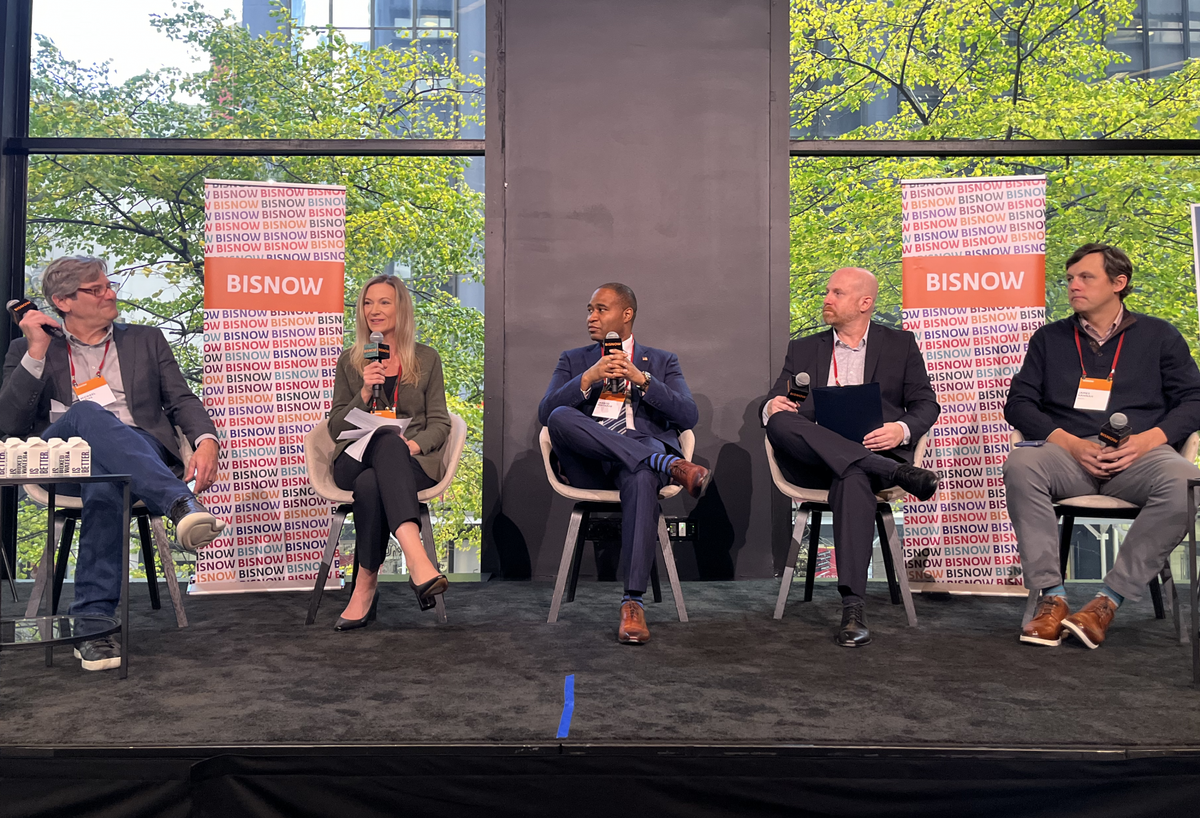As more landlords and property managers are integrating artificial intelligence into their operations, they found two major benefits — more seamless renter experiences and less need for human staff.

Bisnow/Ciara Long
Andrena’s Michael Weiss, ESRT’s Jackie Renton, RXR’s Jarrod Whittaker, AvalonBay’s Micah Parker and Parity’s James Hannah onstage at Bisnow’s 2025 New York Multifamily Development and Operations Conference.
New York City renters are paying more than ever before to live in their apartments. In return, they expect services like round-the-clock responses from landlords and pragmatic building amenities, industry executives said Tuesday at Bisnow’s New York Multifamily Development and Operations Conference.
So despite real estate’s famed reluctance to embrace new technology, owners who have only recently begun exploring AI applications are seeing increased tenant satisfaction and reduced payroll expenses.
“You can’t rapidly change rent performance in any market,” RXR Head of Operations Jarrod Whittaker said onstage at Convene One Liberty Plaza. “But you can look strategically at operating expenses to see where technology can be used.”
With the median rent in Manhattan in September coming in at $4,550 a month, plus $3,925 in Brooklyn and $3,650 in Northwestern Queens, according to Douglas Elliman, renters expect the level of service and spaces to match their high price tag.
“It used to be multifamily [was] commoditized, ‘Give me an apartment, don’t talk to me, I’ll call the super if something’s broken,’” Rudin Head of Multifamily Raymond Houseknecht said. “Then, hotel, five stars, someone’s waiting on you, hand and foot. They’ve merged.”

Bisnow/Ciara Long
Citrin Cooperman’s Blake Boshnack, Charney Cos.’ Rosie Tilley, Warshaw Burstein’s Sam Marchese, Carmel Partners’ Lee Bloch and Gotham Organization’s Simeon Maleh onstage at Bisnow’s 2025 New York Multifamily Development and Operations Conference.
Even amid record low vacancies and high rents, tenants are willing to find somewhere new to live if they feel that their expectations aren’t being met — whether that’s a gym that doesn’t have enough machines or a hard-to-reach manager.
“They expect a very high level of service,” said Aida Stoddard, senior vice president of development at MAG Partners. “They want top-notch, white glove service and they will leave your building in a heartbeat if they feel they’re not getting that.”
Landlords are increasingly leaning on AI and digital automation to meet those demands, with proprietary apps, chatbots and online portals so that tenants can get answers to queries and responses to maintenance requests fast.
When AvalonBay Communities switched from physical paperwork to online filings in 2008, it saw efficiency gains right away, the REIT’s vice president of operations, Micah Parker, said onstage. Three years ago, it turned to AI in the hopes that staying on top of the latest technology would add to tenant stickiness.
“We all know we can’t afford to have our communities open 24/7, 365, staffed, with people on-site,” Parker said. “So we really look for AI alternatives that would be available to be able to meet the customer’s questions.”

Bisnow/Ciara Long
Keynote speaker Jonathan Rose, of Jonathan Rose Cos., and Goulston & Storrs’ Debbie Horowitz onstage at Bisnow’s 2025 New York Multifamily Development and Operations Conference.
AI has helped landlords trim some fat from operations. Multifamily usage of AI had led to a 10% savings on employee payrolls, a 15% increase in renter retention and a 5% improvement in tenant satisfaction, a February survey from the National Apartment Association found.
Some property owners at Bisnow’s event said AI is especially useful for tasks that can be easily automated, such as chasing renters for arrears, signing leases and taking in maintenance requests.
Landlords’ AI adoption means that basic, day-to-day tasks in apartment buildings are slowly becoming operations that don’t require human input, Empire State Realty Trust co-Head of Real Estate and Chief Operating Officer Jackie Renton said. The new efficiencies are leading to savings.
“It was a very pleasant surprise that we realized our collections were up and we reduced maybe four hours a week of manpower,” she said. “You can diversify across your portfolio and really create scale that way.”

Bisnow/Ciara Long
NFP’s Erin Rogol, Lendlease’s Lath Madi, MAG Partners’ Aida Stoddard, SGA’s Reza Rahimpour and Rudin’s Raymond Houseknecht.
RXR has created its own AI chatbot that automatically answers questions from prospective tenants, such as what apartments are renting for, and to help existing tenants with issues like billing queries, Whittaker said.
AvalonBay has also reduced its headcount and the staffing costs that come with it by incorporating AI, Parker said.
Last year, it established a remote customer care center to cater to its 91,000 units across the country. The landlord had previously employed roughly one associate per every hundred units — a figure that is now down to between 0.82 to 0.85 associates per 100 units, he said.
“We’re still going, so I don’t know where we will land. I don’t think we’ll ever stop,” he said. “We are well underway on creating extra value and efficiency.”
There have been other, unexpected benefits, he said. While automation means the landlord has fewer on-site employees, its remaining workers have been able to specialize and now report higher levels of job satisfaction than previously.
“It allows our associates to handle the issues that they like and to provide the service that they like without the mundane part of the job,” he said.
